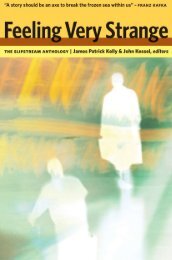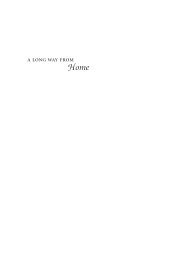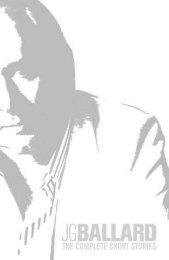The Curse of the Wer.. - Site de Thomas - Free
The Curse of the Wer.. - Site de Thomas - Free
The Curse of the Wer.. - Site de Thomas - Free
You also want an ePaper? Increase the reach of your titles
YUMPU automatically turns print PDFs into web optimized ePapers that Google loves.
60 THE CURSE OF THE WEREWOLF<br />
In <strong>the</strong> context <strong>of</strong> <strong>the</strong> convergence <strong>of</strong> i<strong>de</strong>as about evolution and <strong>the</strong><br />
unconscious (which <strong>de</strong>man<strong>de</strong>d a ‘thinking toge<strong>the</strong>r’ <strong>of</strong> such pairings),<br />
representations <strong>of</strong> body–mind slippages within fin <strong>de</strong> siècle<br />
Gothic became ‘more graphic than before’. 57 Significantly, spiritualist<br />
discourse also contributed to <strong>the</strong> exploration <strong>of</strong> this territory. C.W.<br />
Leadbeater’s explanation <strong>of</strong> lycanthropy as a form <strong>of</strong> astral projection,<br />
for example, sought to draw a connection between <strong>the</strong> body and <strong>the</strong><br />
mind: ‘When a perfectly cruel and brutal man [projects <strong>the</strong> astral<br />
body], <strong>the</strong>re are certain circumstances un<strong>de</strong>r which <strong>the</strong> body may be<br />
seized upon by o<strong>the</strong>r astral i<strong>de</strong>ntities and materialized, not into <strong>the</strong><br />
human form, but into that <strong>of</strong> some wild animal — usually <strong>the</strong> wolf.’ 58 By<br />
positing a relationship between spirit and material nature, Leadbeater<br />
also echoed <strong>the</strong> logic <strong>of</strong> <strong>the</strong> romantic philosopher Friedrich Wilhelm<br />
von Schelling, who <strong>de</strong>clared that ‘Nature is visible Spirit, Spirit is<br />
invisible Nature.’ 59 Schelling’s statement apparently encapsulated <strong>the</strong><br />
romantic i<strong>de</strong>a that an organic whole or unity could be constituted<br />
through antagonistic but complementary polarities. But, as Slavoj<br />
Žižek points out, it also<br />
drove a wedge … between Insi<strong>de</strong> and Outsi<strong>de</strong>, between Spirit and Body,<br />
between <strong>the</strong> i<strong>de</strong>al and <strong>the</strong> real … by calling attention to <strong>the</strong> double<br />
surplus that ‘sticks out’. On <strong>the</strong> one hand, <strong>the</strong>re is <strong>the</strong> spiritual element <strong>of</strong><br />
corporeality: <strong>the</strong> presence, in matter itself, <strong>of</strong> a non-material but physical<br />
element, <strong>of</strong> a subtle corpse, relatively in<strong>de</strong>pen<strong>de</strong>nt <strong>of</strong> time and space,<br />
which provi<strong>de</strong>s <strong>the</strong> material base <strong>of</strong> our free will (animal magnetism,<br />
etc.); on <strong>the</strong> o<strong>the</strong>r hand, <strong>the</strong>re is <strong>the</strong> corporeal element <strong>of</strong> spirituality: <strong>the</strong><br />
materializations <strong>of</strong> <strong>the</strong> spirit in a kind <strong>of</strong> pseudo-stuff, in substanceless<br />
apparitions (ghosts, living <strong>de</strong>ad). 60<br />
Žižek argues that <strong>the</strong>se ‘surpluses’ that escape <strong>the</strong> system <strong>of</strong> neat<br />
polarities are <strong>the</strong> spectral manifestations (such as <strong>the</strong> werewolf) that<br />
‘complete’ reality. 61<br />
In this context, <strong>the</strong> werewolf becomes less amenable to an analytic<br />
strategy which interprets it primarily as an expression <strong>of</strong> oppositional<br />
discursive frameworks (such as nature–culture, masculine–feminine,<br />
Self–O<strong>the</strong>r). In Žižek’s schema, <strong>the</strong> werewolf is ra<strong>the</strong>r an expression<br />
<strong>of</strong> <strong>the</strong> overflow, surplus or excess that escapes attempts to contain





